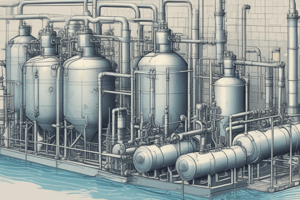Podcast
Questions and Answers
What is the primary unit of hardness of water?
What is the primary unit of hardness of water?
- Milligrams per liter (mg/L)
- Parts per million (ppm)
- Degrees Clark (°Clark)
- Grains per gallon (gpg) (correct)
What is the method used to determine the hardness of water?
What is the method used to determine the hardness of water?
- EDTA method (correct)
- Colorimetric method
- Gravimetric method
- Titration method
What is the primary disadvantage of hard water in boilers?
What is the primary disadvantage of hard water in boilers?
- Corrosion of boiler tubes
- Scale and Sludge formation (correct)
- Caustic embrittlement
- All of the above
What is the process used to soften water by exchanging sodium ions for calcium and magnesium ions?
What is the process used to soften water by exchanging sodium ions for calcium and magnesium ions?
What is the process used to remove impurities from water by applying pressure to force the water through a semi-permeable membrane?
What is the process used to remove impurities from water by applying pressure to force the water through a semi-permeable membrane?
What is the main cause of scale and sludge formation in boilers?
What is the main cause of scale and sludge formation in boilers?
What is the primary purpose of softening water in boilers?
What is the primary purpose of softening water in boilers?
Which of the following is a numerical problem that can be solved using the Zeolite process?
Which of the following is a numerical problem that can be solved using the Zeolite process?
What is the primary effect of caustic embritlement in boilers?
What is the primary effect of caustic embritlement in boilers?
What is the primary advantage of using Reverse Osmosis (RO) for water treatment?
What is the primary advantage of using Reverse Osmosis (RO) for water treatment?
What is the primary cause of boiler corrosion in hard water?
What is the primary cause of boiler corrosion in hard water?
What is the purpose of Zeolite process in water treatment?
What is the purpose of Zeolite process in water treatment?
What is the primary disadvantage of hard water in boilers?
What is the primary disadvantage of hard water in boilers?
What is the primary purpose of Ion exchange process in water treatment?
What is the primary purpose of Ion exchange process in water treatment?
What is the primary effect of Priming and Foaming in boilers?
What is the primary effect of Priming and Foaming in boilers?
What is the process of removing impurities from water by exchanging sodium ions for calcium and magnesium ions?
What is the process of removing impurities from water by exchanging sodium ions for calcium and magnesium ions?
What is the primary purpose of using Zeolite process in water treatment?
What is the primary purpose of using Zeolite process in water treatment?
What is the process of removing impurities from water by applying pressure to force the water through a semi-permeable membrane?
What is the process of removing impurities from water by applying pressure to force the water through a semi-permeable membrane?
What is the common method used to determine the hardness of water?
What is the common method used to determine the hardness of water?
What is the numerical problem that can be solved using the Zeolite process?
What is the numerical problem that can be solved using the Zeolite process?
What is the primary mechanism of water softening in the Ion exchange process?
What is the primary mechanism of water softening in the Ion exchange process?
Which of the followingprocesses is used to remove impurities from water by applying pressure to force the water through a semi-permeable membrane?
Which of the followingprocesses is used to remove impurities from water by applying pressure to force the water through a semi-permeable membrane?
What is the primary purpose of softening water in boilers?
What is the primary purpose of softening water in boilers?
Which of the following processes is used to soften water by exchanging sodium ions for calcium and magnesium ions?
Which of the following processes is used to soften water by exchanging sodium ions for calcium and magnesium ions?
What is the primary advantage of using Zeolite process in water treatment?
What is the primary advantage of using Zeolite process in water treatment?
Flashcards are hidden until you start studying
Study Notes
Hardness of Water
- Hardness of water is categorized into two types: Temporary hardness and Permanent hardness
- Temporary hardness is due to the presence of bicarbonate salts of calcium and magnesium, which can be removed by boiling
- Permanent hardness is due to the presence of sulfate, chloride, and nitrate salts of calcium and magnesium, which cannot be removed by boiling
- The unit of hardness is measured in milligrams per liter (mg/L) or parts per million (ppm)
- EDTA (Ethylene Diamine Tetraacetic Acid) method is used to determine the hardness of water
Disadvantages of Hard Water
- Hard water causes Boiler troubles, including:
- Scale formation, which reduces heat transfer and increases fuel consumption
- Sludge formation, which reduces the boiler's efficiency
- Caustic embrittlement, which leads to boiler failure
- Priming and Foaming, which causes carryover of water into the steam
- Boiler corrosion, which reduces the boiler's lifespan
Softening of Water
- Softening of water can be done through three methods:
- Zeolite process, which involves exchanging sodium ions for calcium and magnesium ions
- Ion exchange process, which involves exchanging hydrogen ions for calcium and magnesium ions
- Reverse Osmosis (RO), which involves using a semi-permeable membrane to remove ions and minerals
Numerical Problems
- Calculations of hardness involve determining the concentration of calcium and magnesium ions in water
- Zeolite process problems involve calculating the amount of sodium ions required to remove a certain amount of calcium and magnesium ions
Water Hardness
- Hardness of water is of two types:
- Temporary hardness (Carbonate hardness)
- Permanent hardness (Non-carbonate hardness)
Unit of Hardness
- Unit of hardness is milligrams per liter (mg/L) or parts per million (ppm)
Determination of Hardness by EDTA Method
- EDTA (Ethylene Diamine Tetra Acetic acid) method is used to determine total hardness of water
Disadvantages of Hard Water
- Scale formation: Deposits of calcium carbonate, magnesium carbonate and calcium sulfate
- Sludge formation: Deposits of magnesium hydroxide, iron oxide and aluminum oxide
- Caustic embrittlement: Weakening of metal boilers due to high pH
- Priming and foaming: Formation of steam bubbles in boilers
- Boiler corrosion: Corrosion of boiler metal due to acidic nature of water
Water Softening Methods
Zeolite Process
- Softening of water using naturally occurring minerals called zeolites
- Zeolites remove calcium and magnesium ions from water, replacing them with sodium ions
Ion Exchange Process
- Softening of water by exchanging sodium ions for calcium and magnesium ions
- Resin is used to remove calcium and magnesium ions from water
Reverse Osmosis (RO)
- Softening of water by applying pressure to force water through a semi-permeable membrane
- Membrane removes impurities and ions from water, producing soft water
Hardness of Water
- Hardness of water is a measure of the amount of calcium and magnesium ions present in water.
- There are two types of hardness: Temporary hardness ( bicarbonate-based) and Permanent hardness (non-bicarbonate-based).
Unit of Hardness
- The unit of hardness is milligrams per liter (mg/L) or parts per million (ppm).
- It can also be expressed in terms of degree of hardness, with one degree of hardness equal to 10 mg/L of calcium oxide.
Determination of Hardness by EDTA Method
- EDTA (Ethylene Diamine Tetra Acetic acid) is used to complex with calcium and magnesium ions in water.
- The amount of EDTA required to complex with these ions is directly proportional to the hardness of water.
Disadvantages of Hard Water
- Hard water causes scaling in boilers, leading to reduced efficiency and increased fuel consumption.
- It also leads to sludge formation, caustic embrittlement, and corrosion in boilers.
Boiler Troubles
- Scale formation: Hard water leads to the formation of scales, which reduce heat transfer and increase pressure.
- Sludge formation: Hard water causes the formation of sludge, which can clog pipes and reduce boiler efficiency.
- Caustic embrittlement: Hard water can cause the formation of caustic soda, leading to embrittlement of boiler materials.
- Priming and Foaming: Hard water can cause priming and foaming, leading to carryover of water into steam.
- Boiler corrosion: Hard water can cause corrosion of boiler materials, leading to boiler failure.
Water Softening
- Zeolite process: Involves exchanging sodium ions for calcium and magnesium ions, making water soft.
- Ion exchange process: Involves exchanging sodium ions for calcium and magnesium ions, making water soft.
- Reverse Osmosis (RO): Involves using a semi-permeable membrane to remove ions from water, making it soft.
Numerical Problems
- Calculations of hardness involve determining the amount of calcium and magnesium ions present in water.
- Calculations of Zeolite process involve determining the amount of sodium ions required to exchange with calcium and magnesium ions.
Hardness of Water
- There are different types of hardness of water
- Unit of hardness is measured in mg/L or ppm (parts per million)
- Hardness of water can be determined by EDTA method
Disadvantages of Hard Water
- Causes boiler troubles: scale and sludge formation, caustic embritlement, priming and foaming, and boiler corrosion
Softening of Water
- Can be done by Zeolite process, Ion exchange process, and Reverse Osmosis (RO)
- Softening of water is necessary to prevent boiler troubles and damage to equipment
Numerical Problems
- Calculations of hardness and Zeolite process are important for water treatment and analysis
- Numerical problems can help understand the principles of water softening and treatment
Hardness of Water
- There are different types of hardness of water
- Unit of hardness is measured in mg/L or ppm (parts per million)
- Hardness of water can be determined by EDTA method
Disadvantages of Hard Water
- Causes boiler troubles: scale and sludge formation, caustic embritlement, priming and foaming, and boiler corrosion
Softening of Water
- Can be done by Zeolite process, Ion exchange process, and Reverse Osmosis (RO)
- Softening of water is necessary to prevent boiler troubles and damage to equipment
Numerical Problems
- Calculations of hardness and Zeolite process are important for water treatment and analysis
- Numerical problems can help understand the principles of water softening and treatment
Studying That Suits You
Use AI to generate personalized quizzes and flashcards to suit your learning preferences.




